Tesco's Cross-Cultural Management: Factors and Theories
VerifiedAdded on 2022/12/26
|15
|5620
|96
Report
AI Summary
This report examines the critical aspects of cross-cultural management within the context of international business, using Tesco as a case study. It begins by defining cross-culture and its importance in a globalized world, highlighting how cultural differences impact managerial practices. The report analyzes various cross-cultural factors, including communication styles, values, attitudes, etiquette, behavior, and ethical considerations, and their influence on management and organizational success. It explores challenges related to language barriers, differing business ethics, and the need for adapting management practices to suit local cultural norms. The report further discusses management practices and how they vary across different cultures, along with the significance of building relationships and understanding motivational factors. The report also touches upon monochronic and polychronic cultural differences and the application of Maslow's motivational theory. Overall, the report provides a comprehensive overview of how cultural awareness and adaptation are essential for businesses like Tesco to succeed in the international market.
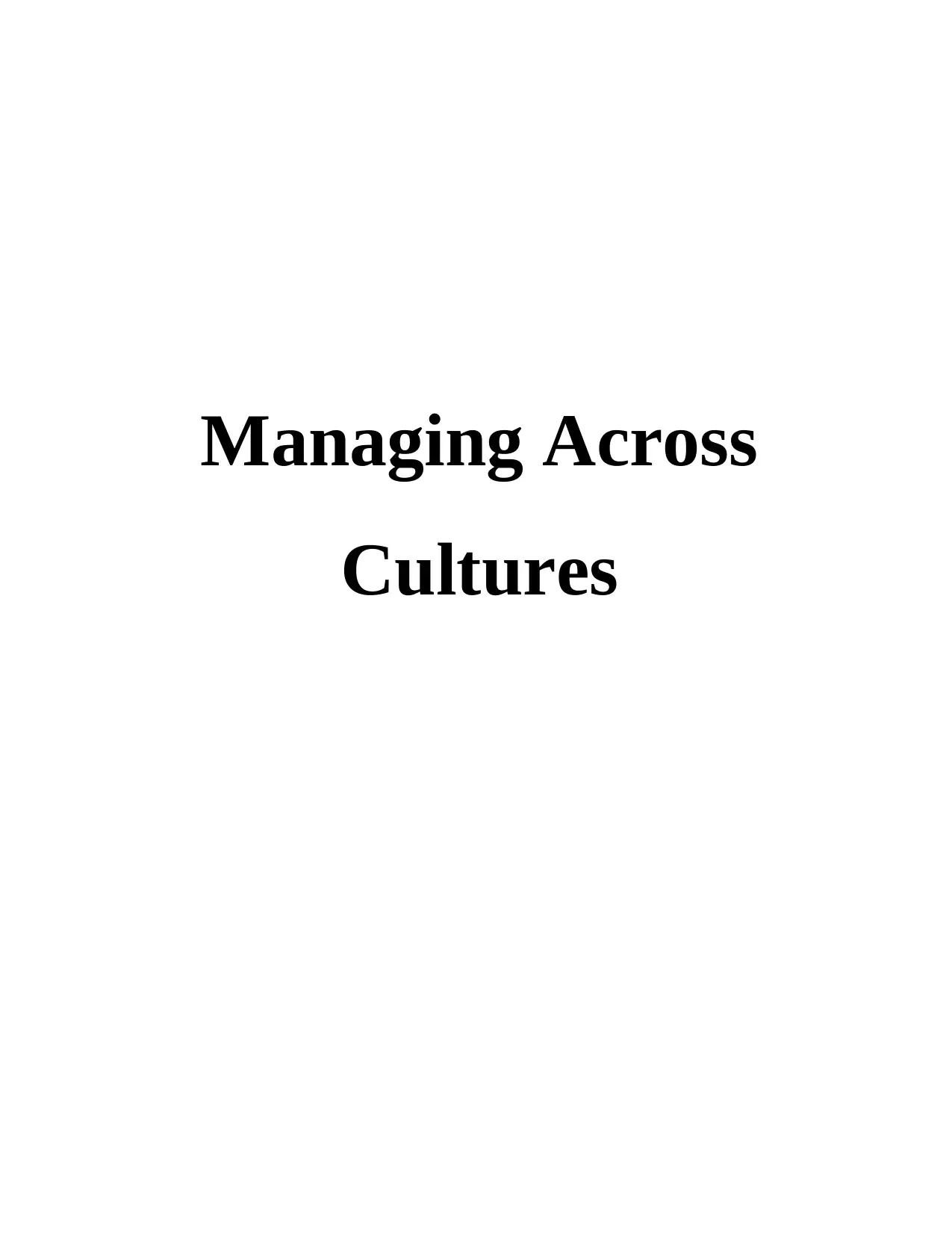
Managing Across
Cultures
Cultures
Paraphrase This Document
Need a fresh take? Get an instant paraphrase of this document with our AI Paraphraser
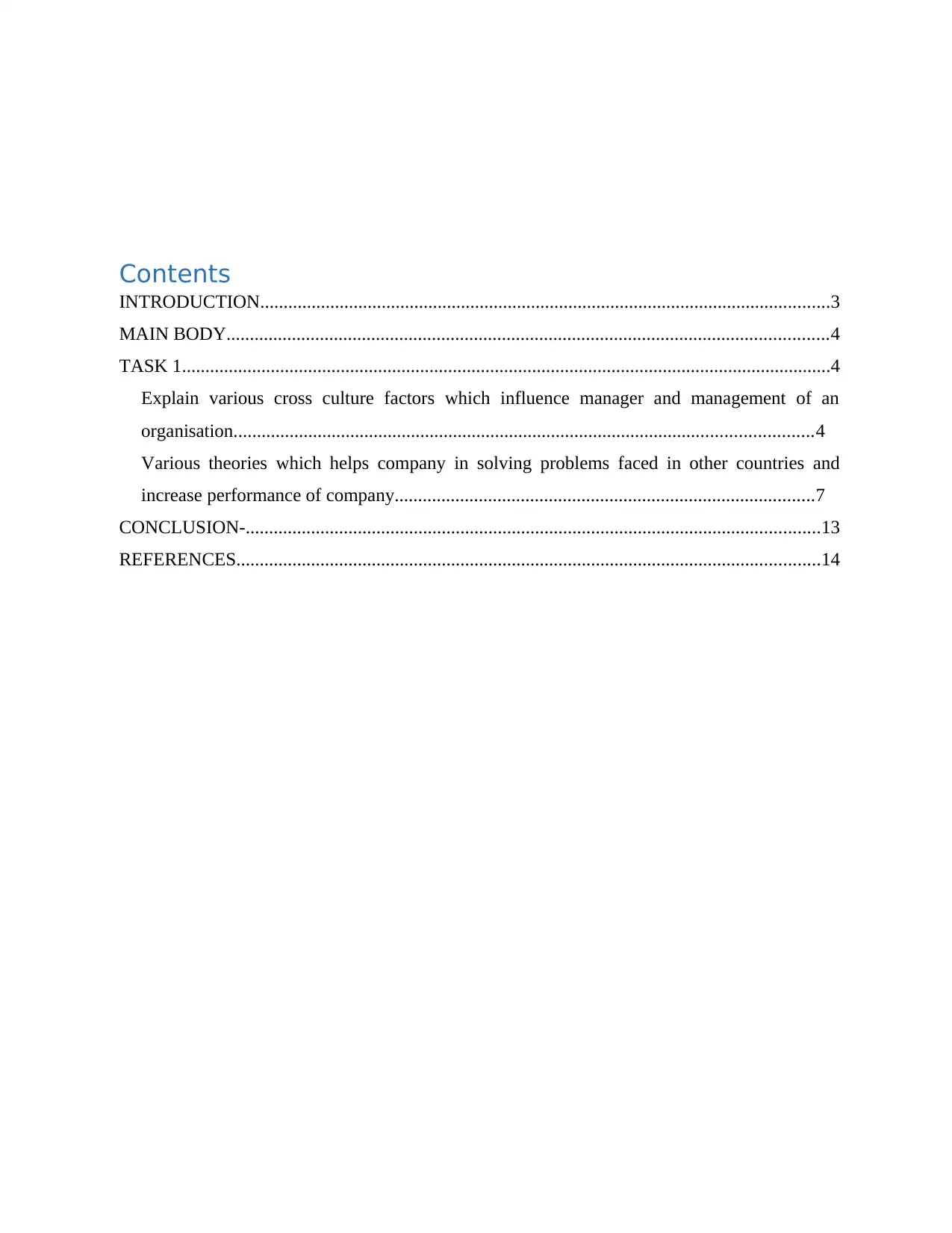
Contents
INTRODUCTION..........................................................................................................................3
MAIN BODY.................................................................................................................................4
TASK 1...........................................................................................................................................4
Explain various cross culture factors which influence manager and management of an
organisation............................................................................................................................4
Various theories which helps company in solving problems faced in other countries and
increase performance of company..........................................................................................7
CONCLUSION-...........................................................................................................................13
REFERENCES.............................................................................................................................14
INTRODUCTION..........................................................................................................................3
MAIN BODY.................................................................................................................................4
TASK 1...........................................................................................................................................4
Explain various cross culture factors which influence manager and management of an
organisation............................................................................................................................4
Various theories which helps company in solving problems faced in other countries and
increase performance of company..........................................................................................7
CONCLUSION-...........................................................................................................................13
REFERENCES.............................................................................................................................14
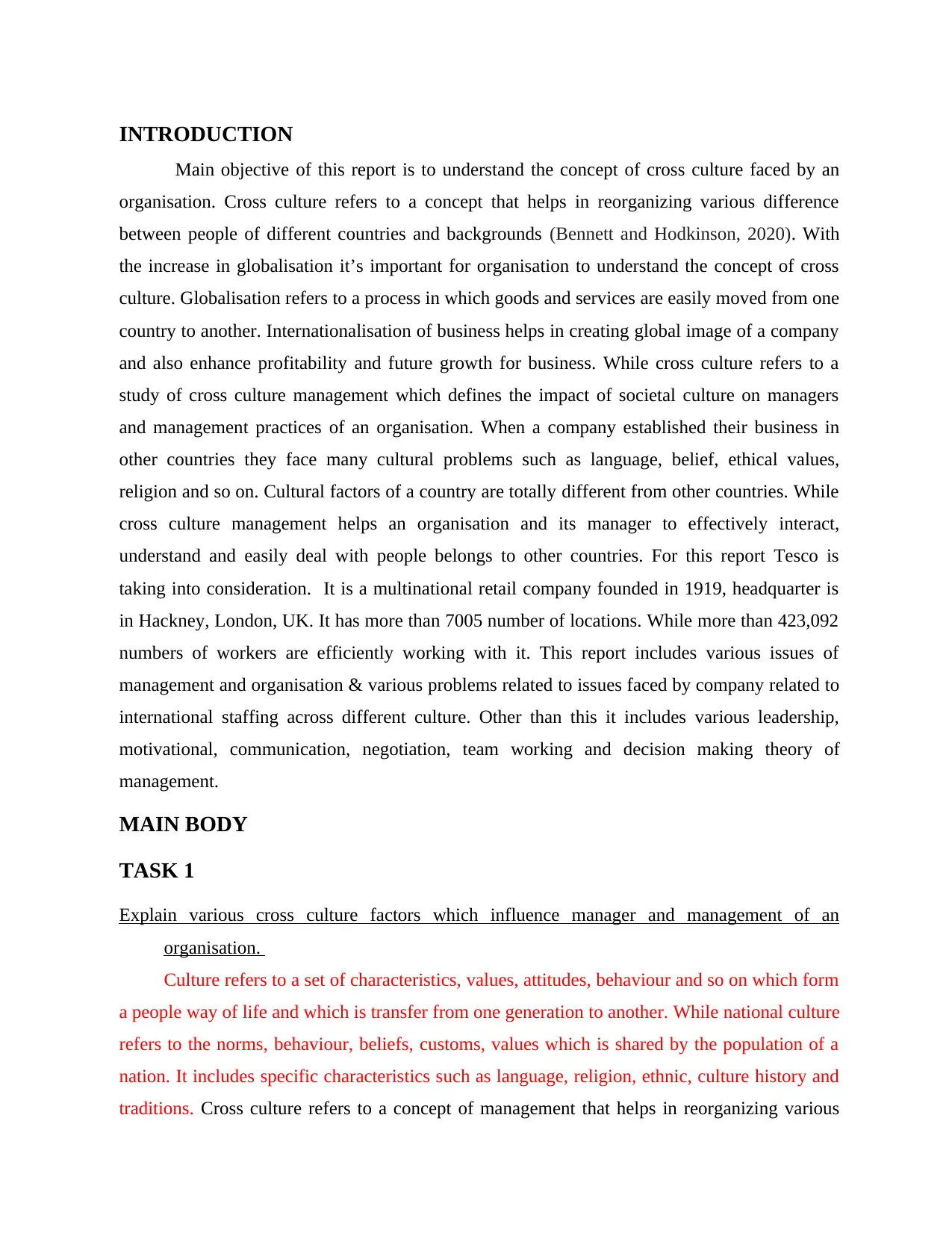
INTRODUCTION
Main objective of this report is to understand the concept of cross culture faced by an
organisation. Cross culture refers to a concept that helps in reorganizing various difference
between people of different countries and backgrounds (Bennett and Hodkinson, 2020). With
the increase in globalisation it’s important for organisation to understand the concept of cross
culture. Globalisation refers to a process in which goods and services are easily moved from one
country to another. Internationalisation of business helps in creating global image of a company
and also enhance profitability and future growth for business. While cross culture refers to a
study of cross culture management which defines the impact of societal culture on managers
and management practices of an organisation. When a company established their business in
other countries they face many cultural problems such as language, belief, ethical values,
religion and so on. Cultural factors of a country are totally different from other countries. While
cross culture management helps an organisation and its manager to effectively interact,
understand and easily deal with people belongs to other countries. For this report Tesco is
taking into consideration. It is a multinational retail company founded in 1919, headquarter is
in Hackney, London, UK. It has more than 7005 number of locations. While more than 423,092
numbers of workers are efficiently working with it. This report includes various issues of
management and organisation & various problems related to issues faced by company related to
international staffing across different culture. Other than this it includes various leadership,
motivational, communication, negotiation, team working and decision making theory of
management.
MAIN BODY
TASK 1
Explain various cross culture factors which influence manager and management of an
organisation.
Culture refers to a set of characteristics, values, attitudes, behaviour and so on which form
a people way of life and which is transfer from one generation to another. While national culture
refers to the norms, behaviour, beliefs, customs, values which is shared by the population of a
nation. It includes specific characteristics such as language, religion, ethnic, culture history and
traditions. Cross culture refers to a concept of management that helps in reorganizing various
Main objective of this report is to understand the concept of cross culture faced by an
organisation. Cross culture refers to a concept that helps in reorganizing various difference
between people of different countries and backgrounds (Bennett and Hodkinson, 2020). With
the increase in globalisation it’s important for organisation to understand the concept of cross
culture. Globalisation refers to a process in which goods and services are easily moved from one
country to another. Internationalisation of business helps in creating global image of a company
and also enhance profitability and future growth for business. While cross culture refers to a
study of cross culture management which defines the impact of societal culture on managers
and management practices of an organisation. When a company established their business in
other countries they face many cultural problems such as language, belief, ethical values,
religion and so on. Cultural factors of a country are totally different from other countries. While
cross culture management helps an organisation and its manager to effectively interact,
understand and easily deal with people belongs to other countries. For this report Tesco is
taking into consideration. It is a multinational retail company founded in 1919, headquarter is
in Hackney, London, UK. It has more than 7005 number of locations. While more than 423,092
numbers of workers are efficiently working with it. This report includes various issues of
management and organisation & various problems related to issues faced by company related to
international staffing across different culture. Other than this it includes various leadership,
motivational, communication, negotiation, team working and decision making theory of
management.
MAIN BODY
TASK 1
Explain various cross culture factors which influence manager and management of an
organisation.
Culture refers to a set of characteristics, values, attitudes, behaviour and so on which form
a people way of life and which is transfer from one generation to another. While national culture
refers to the norms, behaviour, beliefs, customs, values which is shared by the population of a
nation. It includes specific characteristics such as language, religion, ethnic, culture history and
traditions. Cross culture refers to a concept of management that helps in reorganizing various
⊘ This is a preview!⊘
Do you want full access?
Subscribe today to unlock all pages.

Trusted by 1+ million students worldwide
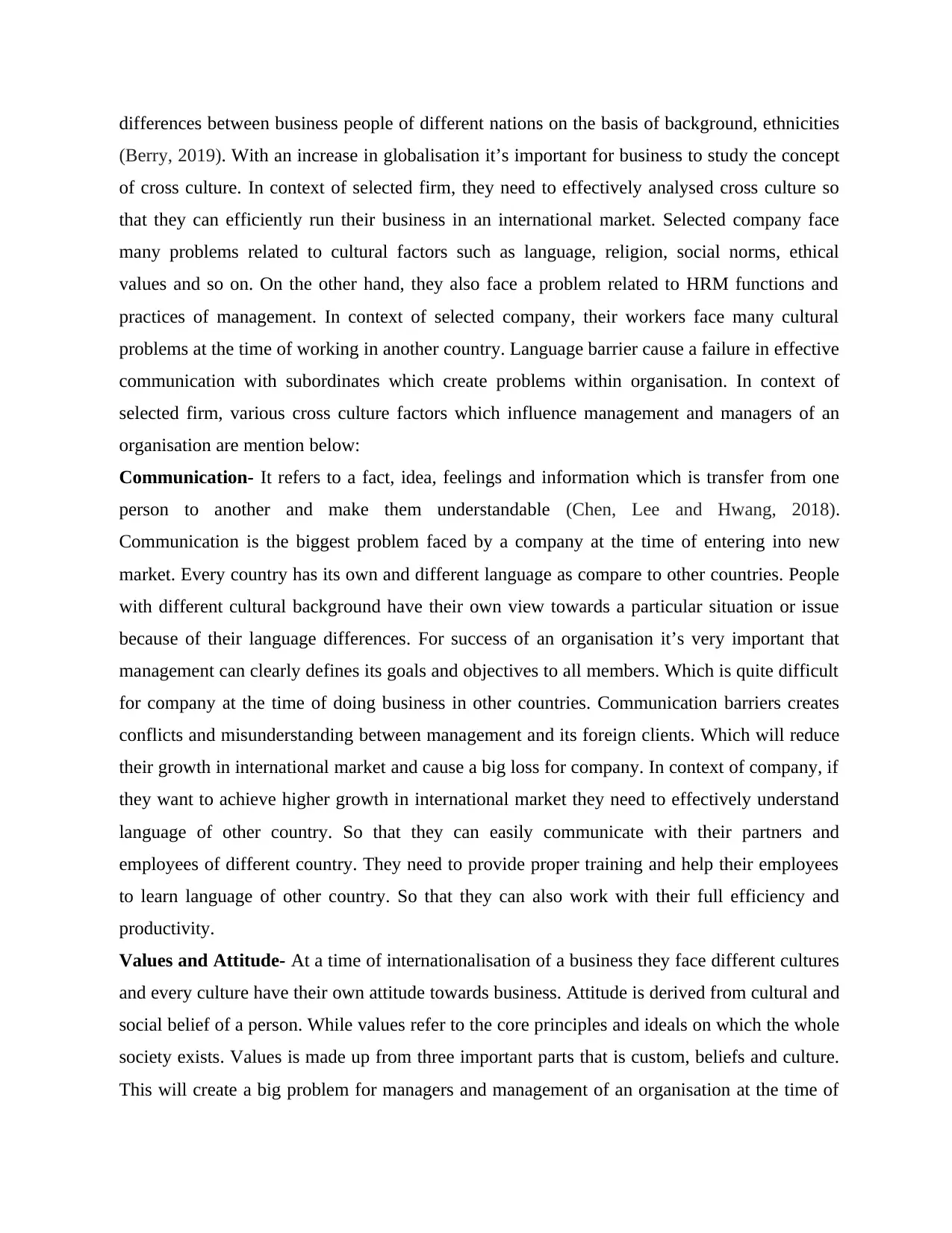
differences between business people of different nations on the basis of background, ethnicities
(Berry, 2019). With an increase in globalisation it’s important for business to study the concept
of cross culture. In context of selected firm, they need to effectively analysed cross culture so
that they can efficiently run their business in an international market. Selected company face
many problems related to cultural factors such as language, religion, social norms, ethical
values and so on. On the other hand, they also face a problem related to HRM functions and
practices of management. In context of selected company, their workers face many cultural
problems at the time of working in another country. Language barrier cause a failure in effective
communication with subordinates which create problems within organisation. In context of
selected firm, various cross culture factors which influence management and managers of an
organisation are mention below:
Communication- It refers to a fact, idea, feelings and information which is transfer from one
person to another and make them understandable (Chen, Lee and Hwang, 2018).
Communication is the biggest problem faced by a company at the time of entering into new
market. Every country has its own and different language as compare to other countries. People
with different cultural background have their own view towards a particular situation or issue
because of their language differences. For success of an organisation it’s very important that
management can clearly defines its goals and objectives to all members. Which is quite difficult
for company at the time of doing business in other countries. Communication barriers creates
conflicts and misunderstanding between management and its foreign clients. Which will reduce
their growth in international market and cause a big loss for company. In context of company, if
they want to achieve higher growth in international market they need to effectively understand
language of other country. So that they can easily communicate with their partners and
employees of different country. They need to provide proper training and help their employees
to learn language of other country. So that they can also work with their full efficiency and
productivity.
Values and Attitude- At a time of internationalisation of a business they face different cultures
and every culture have their own attitude towards business. Attitude is derived from cultural and
social belief of a person. While values refer to the core principles and ideals on which the whole
society exists. Values is made up from three important parts that is custom, beliefs and culture.
This will create a big problem for managers and management of an organisation at the time of
(Berry, 2019). With an increase in globalisation it’s important for business to study the concept
of cross culture. In context of selected firm, they need to effectively analysed cross culture so
that they can efficiently run their business in an international market. Selected company face
many problems related to cultural factors such as language, religion, social norms, ethical
values and so on. On the other hand, they also face a problem related to HRM functions and
practices of management. In context of selected company, their workers face many cultural
problems at the time of working in another country. Language barrier cause a failure in effective
communication with subordinates which create problems within organisation. In context of
selected firm, various cross culture factors which influence management and managers of an
organisation are mention below:
Communication- It refers to a fact, idea, feelings and information which is transfer from one
person to another and make them understandable (Chen, Lee and Hwang, 2018).
Communication is the biggest problem faced by a company at the time of entering into new
market. Every country has its own and different language as compare to other countries. People
with different cultural background have their own view towards a particular situation or issue
because of their language differences. For success of an organisation it’s very important that
management can clearly defines its goals and objectives to all members. Which is quite difficult
for company at the time of doing business in other countries. Communication barriers creates
conflicts and misunderstanding between management and its foreign clients. Which will reduce
their growth in international market and cause a big loss for company. In context of company, if
they want to achieve higher growth in international market they need to effectively understand
language of other country. So that they can easily communicate with their partners and
employees of different country. They need to provide proper training and help their employees
to learn language of other country. So that they can also work with their full efficiency and
productivity.
Values and Attitude- At a time of internationalisation of a business they face different cultures
and every culture have their own attitude towards business. Attitude is derived from cultural and
social belief of a person. While values refer to the core principles and ideals on which the whole
society exists. Values is made up from three important parts that is custom, beliefs and culture.
This will create a big problem for managers and management of an organisation at the time of
Paraphrase This Document
Need a fresh take? Get an instant paraphrase of this document with our AI Paraphraser
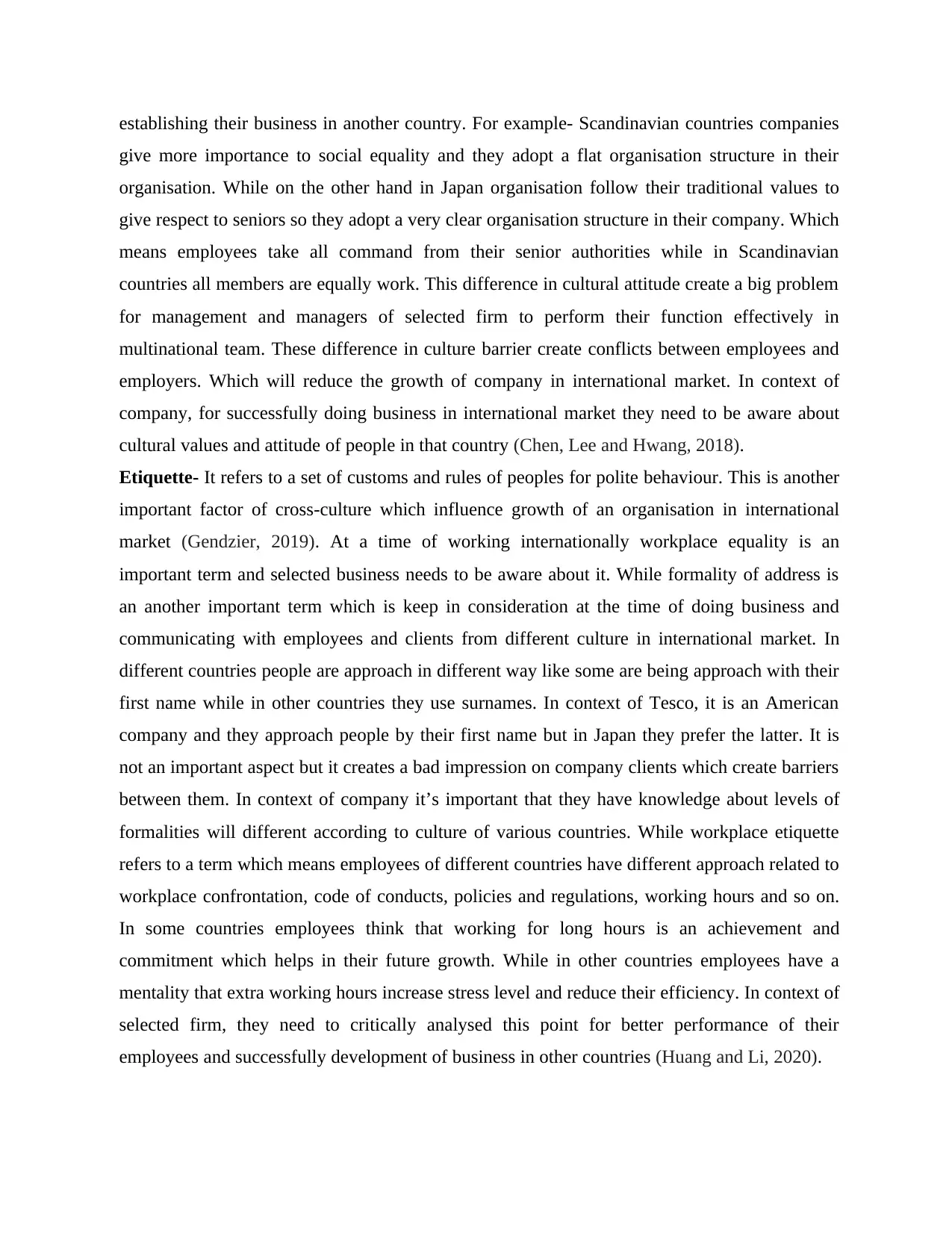
establishing their business in another country. For example- Scandinavian countries companies
give more importance to social equality and they adopt a flat organisation structure in their
organisation. While on the other hand in Japan organisation follow their traditional values to
give respect to seniors so they adopt a very clear organisation structure in their company. Which
means employees take all command from their senior authorities while in Scandinavian
countries all members are equally work. This difference in cultural attitude create a big problem
for management and managers of selected firm to perform their function effectively in
multinational team. These difference in culture barrier create conflicts between employees and
employers. Which will reduce the growth of company in international market. In context of
company, for successfully doing business in international market they need to be aware about
cultural values and attitude of people in that country (Chen, Lee and Hwang, 2018).
Etiquette- It refers to a set of customs and rules of peoples for polite behaviour. This is another
important factor of cross-culture which influence growth of an organisation in international
market (Gendzier, 2019). At a time of working internationally workplace equality is an
important term and selected business needs to be aware about it. While formality of address is
an another important term which is keep in consideration at the time of doing business and
communicating with employees and clients from different culture in international market. In
different countries people are approach in different way like some are being approach with their
first name while in other countries they use surnames. In context of Tesco, it is an American
company and they approach people by their first name but in Japan they prefer the latter. It is
not an important aspect but it creates a bad impression on company clients which create barriers
between them. In context of company it’s important that they have knowledge about levels of
formalities will different according to culture of various countries. While workplace etiquette
refers to a term which means employees of different countries have different approach related to
workplace confrontation, code of conducts, policies and regulations, working hours and so on.
In some countries employees think that working for long hours is an achievement and
commitment which helps in their future growth. While in other countries employees have a
mentality that extra working hours increase stress level and reduce their efficiency. In context of
selected firm, they need to critically analysed this point for better performance of their
employees and successfully development of business in other countries (Huang and Li, 2020).
give more importance to social equality and they adopt a flat organisation structure in their
organisation. While on the other hand in Japan organisation follow their traditional values to
give respect to seniors so they adopt a very clear organisation structure in their company. Which
means employees take all command from their senior authorities while in Scandinavian
countries all members are equally work. This difference in cultural attitude create a big problem
for management and managers of selected firm to perform their function effectively in
multinational team. These difference in culture barrier create conflicts between employees and
employers. Which will reduce the growth of company in international market. In context of
company, for successfully doing business in international market they need to be aware about
cultural values and attitude of people in that country (Chen, Lee and Hwang, 2018).
Etiquette- It refers to a set of customs and rules of peoples for polite behaviour. This is another
important factor of cross-culture which influence growth of an organisation in international
market (Gendzier, 2019). At a time of working internationally workplace equality is an
important term and selected business needs to be aware about it. While formality of address is
an another important term which is keep in consideration at the time of doing business and
communicating with employees and clients from different culture in international market. In
different countries people are approach in different way like some are being approach with their
first name while in other countries they use surnames. In context of Tesco, it is an American
company and they approach people by their first name but in Japan they prefer the latter. It is
not an important aspect but it creates a bad impression on company clients which create barriers
between them. In context of company it’s important that they have knowledge about levels of
formalities will different according to culture of various countries. While workplace etiquette
refers to a term which means employees of different countries have different approach related to
workplace confrontation, code of conducts, policies and regulations, working hours and so on.
In some countries employees think that working for long hours is an achievement and
commitment which helps in their future growth. While in other countries employees have a
mentality that extra working hours increase stress level and reduce their efficiency. In context of
selected firm, they need to critically analysed this point for better performance of their
employees and successfully development of business in other countries (Huang and Li, 2020).
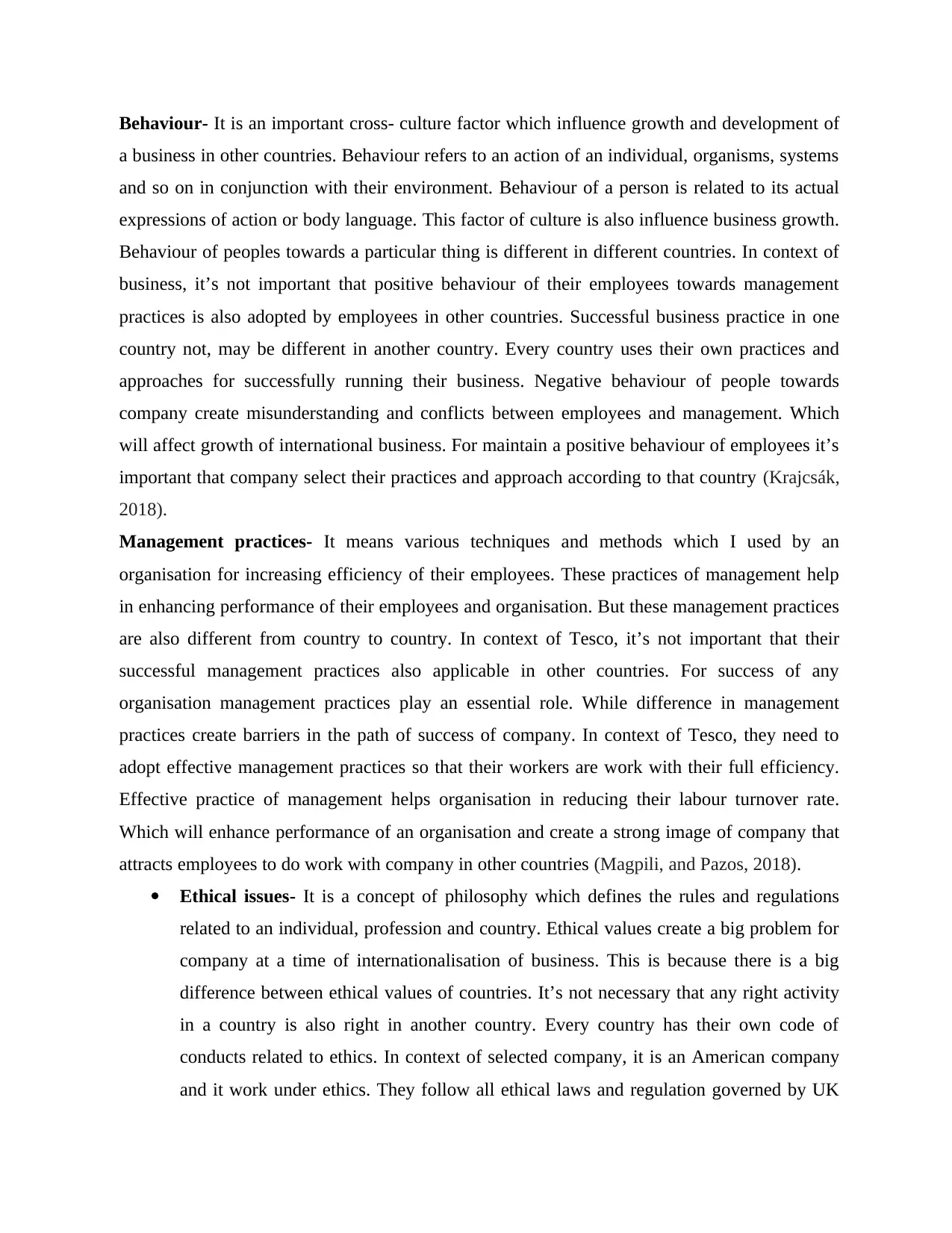
Behaviour- It is an important cross- culture factor which influence growth and development of
a business in other countries. Behaviour refers to an action of an individual, organisms, systems
and so on in conjunction with their environment. Behaviour of a person is related to its actual
expressions of action or body language. This factor of culture is also influence business growth.
Behaviour of peoples towards a particular thing is different in different countries. In context of
business, it’s not important that positive behaviour of their employees towards management
practices is also adopted by employees in other countries. Successful business practice in one
country not, may be different in another country. Every country uses their own practices and
approaches for successfully running their business. Negative behaviour of people towards
company create misunderstanding and conflicts between employees and management. Which
will affect growth of international business. For maintain a positive behaviour of employees it’s
important that company select their practices and approach according to that country (Krajcsák,
2018).
Management practices- It means various techniques and methods which I used by an
organisation for increasing efficiency of their employees. These practices of management help
in enhancing performance of their employees and organisation. But these management practices
are also different from country to country. In context of Tesco, it’s not important that their
successful management practices also applicable in other countries. For success of any
organisation management practices play an essential role. While difference in management
practices create barriers in the path of success of company. In context of Tesco, they need to
adopt effective management practices so that their workers are work with their full efficiency.
Effective practice of management helps organisation in reducing their labour turnover rate.
Which will enhance performance of an organisation and create a strong image of company that
attracts employees to do work with company in other countries (Magpili, and Pazos, 2018).
Ethical issues- It is a concept of philosophy which defines the rules and regulations
related to an individual, profession and country. Ethical values create a big problem for
company at a time of internationalisation of business. This is because there is a big
difference between ethical values of countries. It’s not necessary that any right activity
in a country is also right in another country. Every country has their own code of
conducts related to ethics. In context of selected company, it is an American company
and it work under ethics. They follow all ethical laws and regulation governed by UK
a business in other countries. Behaviour refers to an action of an individual, organisms, systems
and so on in conjunction with their environment. Behaviour of a person is related to its actual
expressions of action or body language. This factor of culture is also influence business growth.
Behaviour of peoples towards a particular thing is different in different countries. In context of
business, it’s not important that positive behaviour of their employees towards management
practices is also adopted by employees in other countries. Successful business practice in one
country not, may be different in another country. Every country uses their own practices and
approaches for successfully running their business. Negative behaviour of people towards
company create misunderstanding and conflicts between employees and management. Which
will affect growth of international business. For maintain a positive behaviour of employees it’s
important that company select their practices and approach according to that country (Krajcsák,
2018).
Management practices- It means various techniques and methods which I used by an
organisation for increasing efficiency of their employees. These practices of management help
in enhancing performance of their employees and organisation. But these management practices
are also different from country to country. In context of Tesco, it’s not important that their
successful management practices also applicable in other countries. For success of any
organisation management practices play an essential role. While difference in management
practices create barriers in the path of success of company. In context of Tesco, they need to
adopt effective management practices so that their workers are work with their full efficiency.
Effective practice of management helps organisation in reducing their labour turnover rate.
Which will enhance performance of an organisation and create a strong image of company that
attracts employees to do work with company in other countries (Magpili, and Pazos, 2018).
Ethical issues- It is a concept of philosophy which defines the rules and regulations
related to an individual, profession and country. Ethical values create a big problem for
company at a time of internationalisation of business. This is because there is a big
difference between ethical values of countries. It’s not necessary that any right activity
in a country is also right in another country. Every country has their own code of
conducts related to ethics. In context of selected company, it is an American company
and it work under ethics. They follow all ethical laws and regulation governed by UK
⊘ This is a preview!⊘
Do you want full access?
Subscribe today to unlock all pages.

Trusted by 1+ million students worldwide
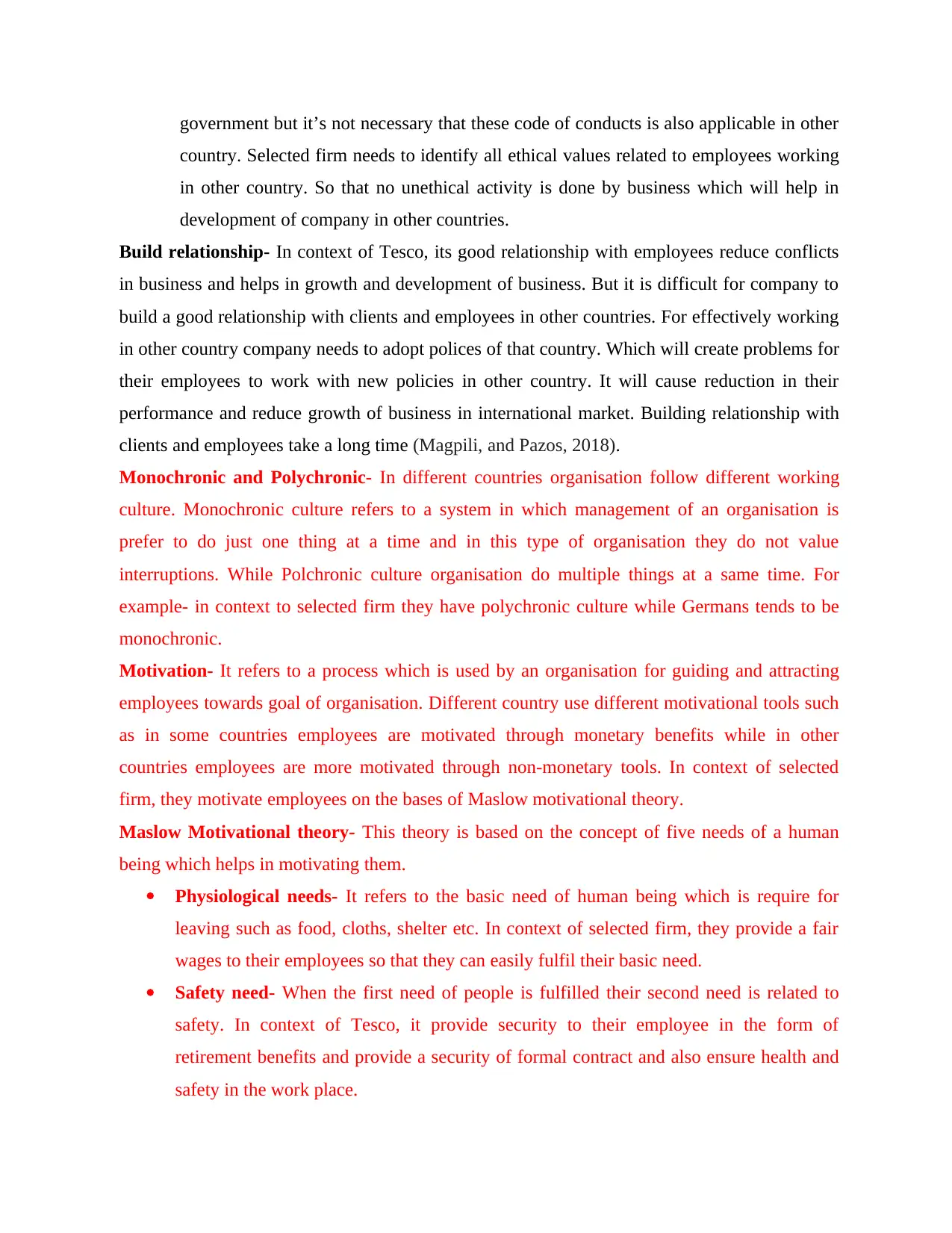
government but it’s not necessary that these code of conducts is also applicable in other
country. Selected firm needs to identify all ethical values related to employees working
in other country. So that no unethical activity is done by business which will help in
development of company in other countries.
Build relationship- In context of Tesco, its good relationship with employees reduce conflicts
in business and helps in growth and development of business. But it is difficult for company to
build a good relationship with clients and employees in other countries. For effectively working
in other country company needs to adopt polices of that country. Which will create problems for
their employees to work with new policies in other country. It will cause reduction in their
performance and reduce growth of business in international market. Building relationship with
clients and employees take a long time (Magpili, and Pazos, 2018).
Monochronic and Polychronic- In different countries organisation follow different working
culture. Monochronic culture refers to a system in which management of an organisation is
prefer to do just one thing at a time and in this type of organisation they do not value
interruptions. While Polchronic culture organisation do multiple things at a same time. For
example- in context to selected firm they have polychronic culture while Germans tends to be
monochronic.
Motivation- It refers to a process which is used by an organisation for guiding and attracting
employees towards goal of organisation. Different country use different motivational tools such
as in some countries employees are motivated through monetary benefits while in other
countries employees are more motivated through non-monetary tools. In context of selected
firm, they motivate employees on the bases of Maslow motivational theory.
Maslow Motivational theory- This theory is based on the concept of five needs of a human
being which helps in motivating them.
Physiological needs- It refers to the basic need of human being which is require for
leaving such as food, cloths, shelter etc. In context of selected firm, they provide a fair
wages to their employees so that they can easily fulfil their basic need.
Safety need- When the first need of people is fulfilled their second need is related to
safety. In context of Tesco, it provide security to their employee in the form of
retirement benefits and provide a security of formal contract and also ensure health and
safety in the work place.
country. Selected firm needs to identify all ethical values related to employees working
in other country. So that no unethical activity is done by business which will help in
development of company in other countries.
Build relationship- In context of Tesco, its good relationship with employees reduce conflicts
in business and helps in growth and development of business. But it is difficult for company to
build a good relationship with clients and employees in other countries. For effectively working
in other country company needs to adopt polices of that country. Which will create problems for
their employees to work with new policies in other country. It will cause reduction in their
performance and reduce growth of business in international market. Building relationship with
clients and employees take a long time (Magpili, and Pazos, 2018).
Monochronic and Polychronic- In different countries organisation follow different working
culture. Monochronic culture refers to a system in which management of an organisation is
prefer to do just one thing at a time and in this type of organisation they do not value
interruptions. While Polchronic culture organisation do multiple things at a same time. For
example- in context to selected firm they have polychronic culture while Germans tends to be
monochronic.
Motivation- It refers to a process which is used by an organisation for guiding and attracting
employees towards goal of organisation. Different country use different motivational tools such
as in some countries employees are motivated through monetary benefits while in other
countries employees are more motivated through non-monetary tools. In context of selected
firm, they motivate employees on the bases of Maslow motivational theory.
Maslow Motivational theory- This theory is based on the concept of five needs of a human
being which helps in motivating them.
Physiological needs- It refers to the basic need of human being which is require for
leaving such as food, cloths, shelter etc. In context of selected firm, they provide a fair
wages to their employees so that they can easily fulfil their basic need.
Safety need- When the first need of people is fulfilled their second need is related to
safety. In context of Tesco, it provide security to their employee in the form of
retirement benefits and provide a security of formal contract and also ensure health and
safety in the work place.
Paraphrase This Document
Need a fresh take? Get an instant paraphrase of this document with our AI Paraphraser
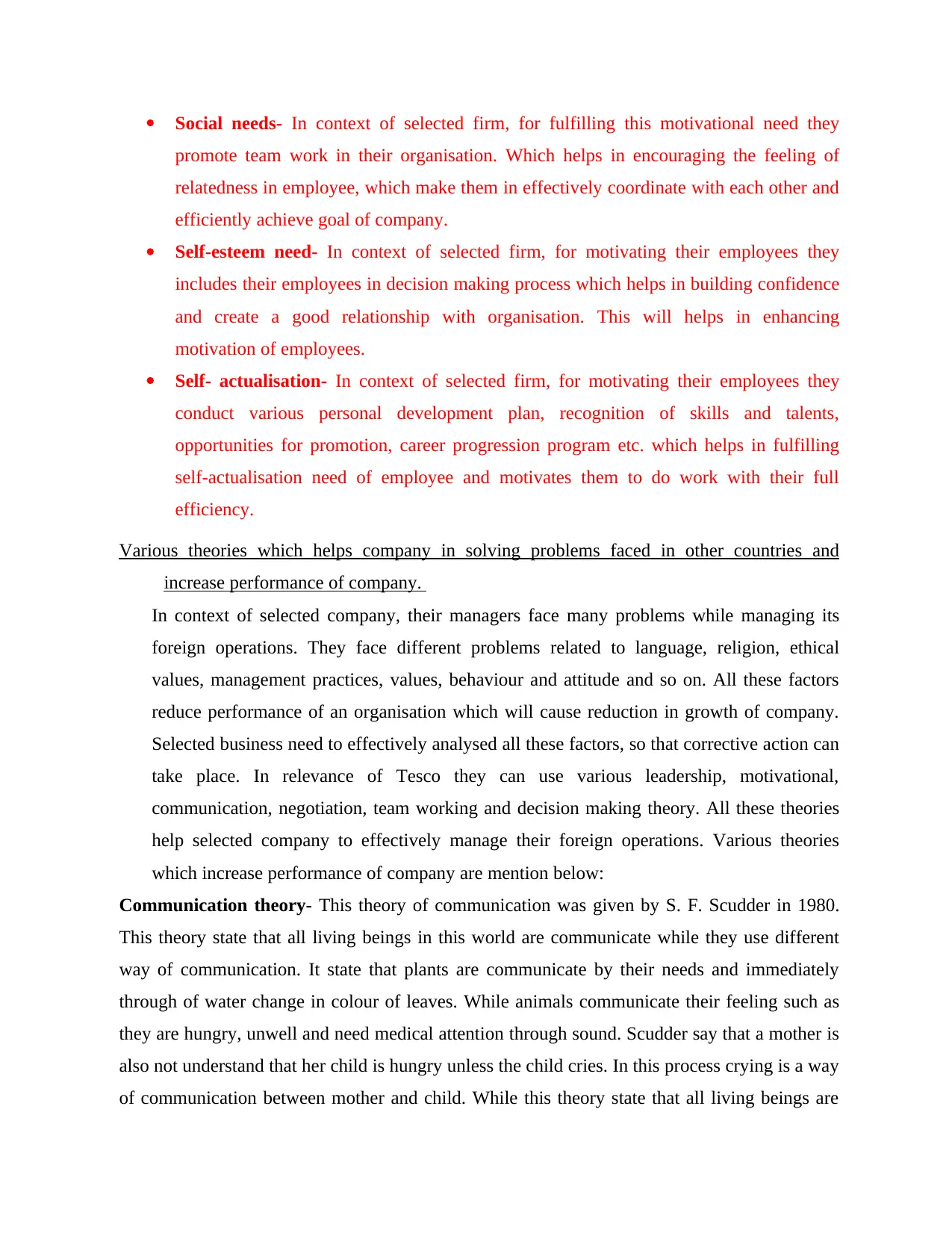
Social needs- In context of selected firm, for fulfilling this motivational need they
promote team work in their organisation. Which helps in encouraging the feeling of
relatedness in employee, which make them in effectively coordinate with each other and
efficiently achieve goal of company.
Self-esteem need- In context of selected firm, for motivating their employees they
includes their employees in decision making process which helps in building confidence
and create a good relationship with organisation. This will helps in enhancing
motivation of employees.
Self- actualisation- In context of selected firm, for motivating their employees they
conduct various personal development plan, recognition of skills and talents,
opportunities for promotion, career progression program etc. which helps in fulfilling
self-actualisation need of employee and motivates them to do work with their full
efficiency.
Various theories which helps company in solving problems faced in other countries and
increase performance of company.
In context of selected company, their managers face many problems while managing its
foreign operations. They face different problems related to language, religion, ethical
values, management practices, values, behaviour and attitude and so on. All these factors
reduce performance of an organisation which will cause reduction in growth of company.
Selected business need to effectively analysed all these factors, so that corrective action can
take place. In relevance of Tesco they can use various leadership, motivational,
communication, negotiation, team working and decision making theory. All these theories
help selected company to effectively manage their foreign operations. Various theories
which increase performance of company are mention below:
Communication theory- This theory of communication was given by S. F. Scudder in 1980.
This theory state that all living beings in this world are communicate while they use different
way of communication. It state that plants are communicate by their needs and immediately
through of water change in colour of leaves. While animals communicate their feeling such as
they are hungry, unwell and need medical attention through sound. Scudder say that a mother is
also not understand that her child is hungry unless the child cries. In this process crying is a way
of communication between mother and child. While this theory state that all living beings are
promote team work in their organisation. Which helps in encouraging the feeling of
relatedness in employee, which make them in effectively coordinate with each other and
efficiently achieve goal of company.
Self-esteem need- In context of selected firm, for motivating their employees they
includes their employees in decision making process which helps in building confidence
and create a good relationship with organisation. This will helps in enhancing
motivation of employees.
Self- actualisation- In context of selected firm, for motivating their employees they
conduct various personal development plan, recognition of skills and talents,
opportunities for promotion, career progression program etc. which helps in fulfilling
self-actualisation need of employee and motivates them to do work with their full
efficiency.
Various theories which helps company in solving problems faced in other countries and
increase performance of company.
In context of selected company, their managers face many problems while managing its
foreign operations. They face different problems related to language, religion, ethical
values, management practices, values, behaviour and attitude and so on. All these factors
reduce performance of an organisation which will cause reduction in growth of company.
Selected business need to effectively analysed all these factors, so that corrective action can
take place. In relevance of Tesco they can use various leadership, motivational,
communication, negotiation, team working and decision making theory. All these theories
help selected company to effectively manage their foreign operations. Various theories
which increase performance of company are mention below:
Communication theory- This theory of communication was given by S. F. Scudder in 1980.
This theory state that all living beings in this world are communicate while they use different
way of communication. It state that plants are communicate by their needs and immediately
through of water change in colour of leaves. While animals communicate their feeling such as
they are hungry, unwell and need medical attention through sound. Scudder say that a mother is
also not understand that her child is hungry unless the child cries. In this process crying is a way
of communication between mother and child. While this theory state that all living beings are
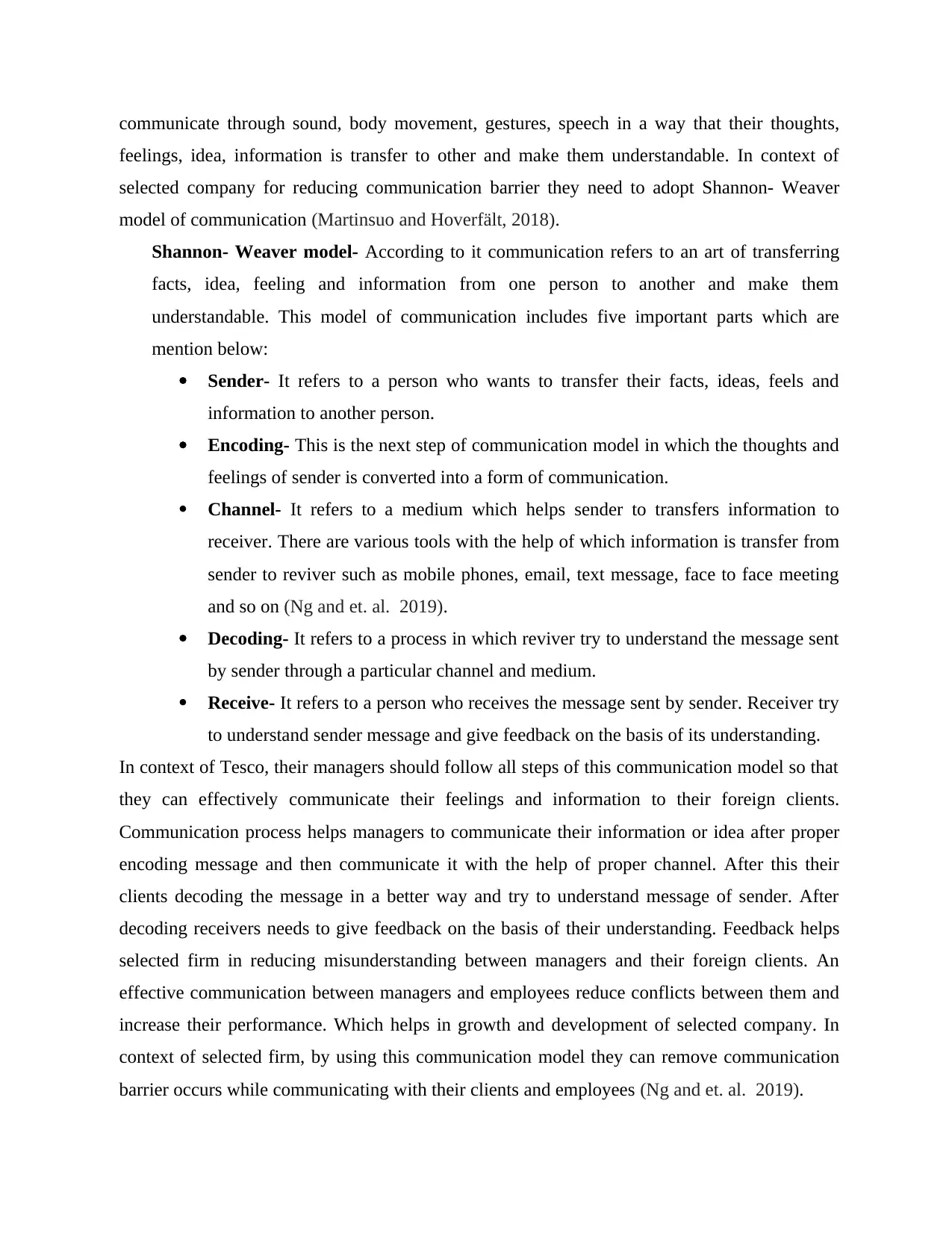
communicate through sound, body movement, gestures, speech in a way that their thoughts,
feelings, idea, information is transfer to other and make them understandable. In context of
selected company for reducing communication barrier they need to adopt Shannon- Weaver
model of communication (Martinsuo and Hoverfält, 2018).
Shannon- Weaver model- According to it communication refers to an art of transferring
facts, idea, feeling and information from one person to another and make them
understandable. This model of communication includes five important parts which are
mention below:
Sender- It refers to a person who wants to transfer their facts, ideas, feels and
information to another person.
Encoding- This is the next step of communication model in which the thoughts and
feelings of sender is converted into a form of communication.
Channel- It refers to a medium which helps sender to transfers information to
receiver. There are various tools with the help of which information is transfer from
sender to reviver such as mobile phones, email, text message, face to face meeting
and so on (Ng and et. al. 2019).
Decoding- It refers to a process in which reviver try to understand the message sent
by sender through a particular channel and medium.
Receive- It refers to a person who receives the message sent by sender. Receiver try
to understand sender message and give feedback on the basis of its understanding.
In context of Tesco, their managers should follow all steps of this communication model so that
they can effectively communicate their feelings and information to their foreign clients.
Communication process helps managers to communicate their information or idea after proper
encoding message and then communicate it with the help of proper channel. After this their
clients decoding the message in a better way and try to understand message of sender. After
decoding receivers needs to give feedback on the basis of their understanding. Feedback helps
selected firm in reducing misunderstanding between managers and their foreign clients. An
effective communication between managers and employees reduce conflicts between them and
increase their performance. Which helps in growth and development of selected company. In
context of selected firm, by using this communication model they can remove communication
barrier occurs while communicating with their clients and employees (Ng and et. al. 2019).
feelings, idea, information is transfer to other and make them understandable. In context of
selected company for reducing communication barrier they need to adopt Shannon- Weaver
model of communication (Martinsuo and Hoverfält, 2018).
Shannon- Weaver model- According to it communication refers to an art of transferring
facts, idea, feeling and information from one person to another and make them
understandable. This model of communication includes five important parts which are
mention below:
Sender- It refers to a person who wants to transfer their facts, ideas, feels and
information to another person.
Encoding- This is the next step of communication model in which the thoughts and
feelings of sender is converted into a form of communication.
Channel- It refers to a medium which helps sender to transfers information to
receiver. There are various tools with the help of which information is transfer from
sender to reviver such as mobile phones, email, text message, face to face meeting
and so on (Ng and et. al. 2019).
Decoding- It refers to a process in which reviver try to understand the message sent
by sender through a particular channel and medium.
Receive- It refers to a person who receives the message sent by sender. Receiver try
to understand sender message and give feedback on the basis of its understanding.
In context of Tesco, their managers should follow all steps of this communication model so that
they can effectively communicate their feelings and information to their foreign clients.
Communication process helps managers to communicate their information or idea after proper
encoding message and then communicate it with the help of proper channel. After this their
clients decoding the message in a better way and try to understand message of sender. After
decoding receivers needs to give feedback on the basis of their understanding. Feedback helps
selected firm in reducing misunderstanding between managers and their foreign clients. An
effective communication between managers and employees reduce conflicts between them and
increase their performance. Which helps in growth and development of selected company. In
context of selected firm, by using this communication model they can remove communication
barrier occurs while communicating with their clients and employees (Ng and et. al. 2019).
⊘ This is a preview!⊘
Do you want full access?
Subscribe today to unlock all pages.

Trusted by 1+ million students worldwide
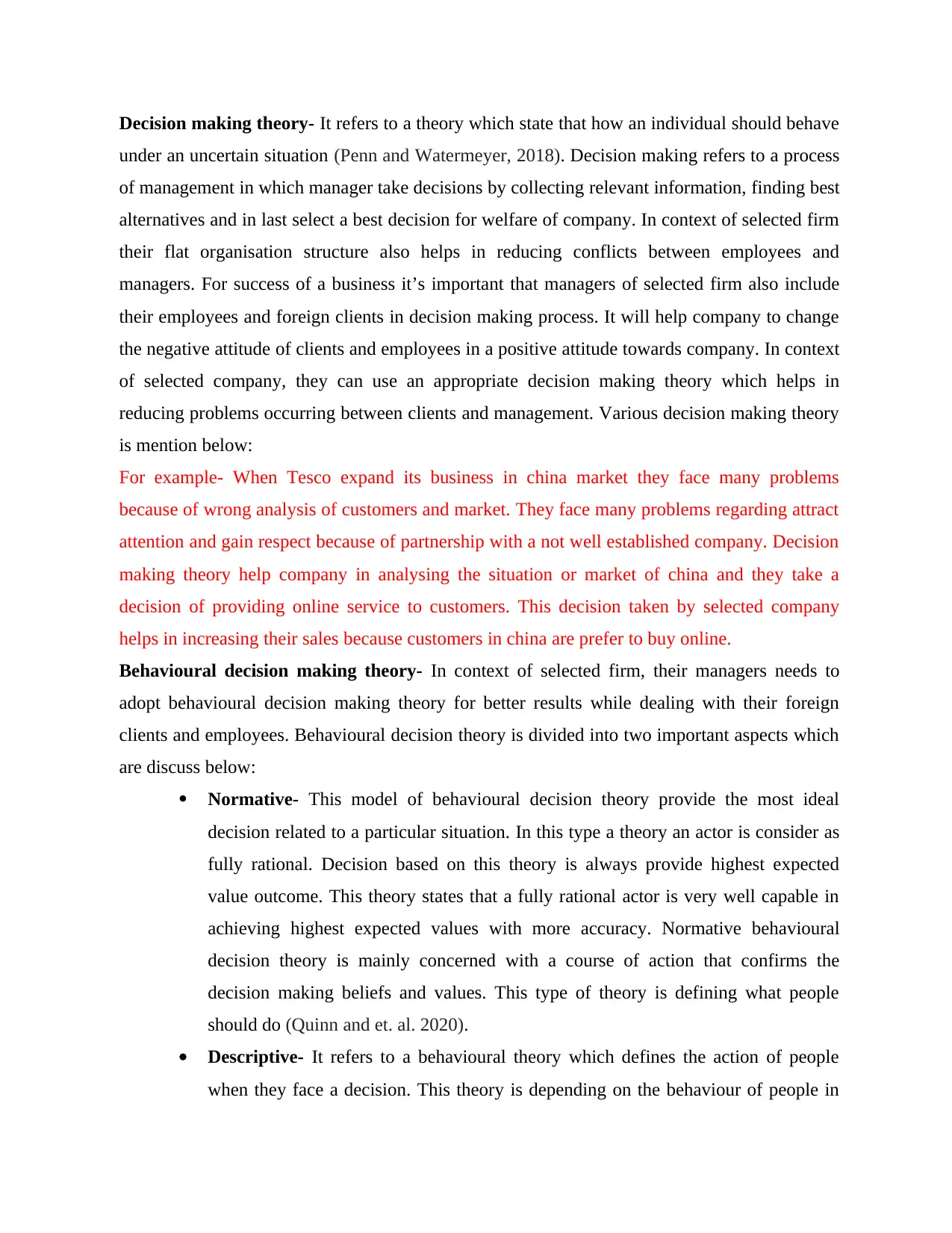
Decision making theory- It refers to a theory which state that how an individual should behave
under an uncertain situation (Penn and Watermeyer, 2018). Decision making refers to a process
of management in which manager take decisions by collecting relevant information, finding best
alternatives and in last select a best decision for welfare of company. In context of selected firm
their flat organisation structure also helps in reducing conflicts between employees and
managers. For success of a business it’s important that managers of selected firm also include
their employees and foreign clients in decision making process. It will help company to change
the negative attitude of clients and employees in a positive attitude towards company. In context
of selected company, they can use an appropriate decision making theory which helps in
reducing problems occurring between clients and management. Various decision making theory
is mention below:
For example- When Tesco expand its business in china market they face many problems
because of wrong analysis of customers and market. They face many problems regarding attract
attention and gain respect because of partnership with a not well established company. Decision
making theory help company in analysing the situation or market of china and they take a
decision of providing online service to customers. This decision taken by selected company
helps in increasing their sales because customers in china are prefer to buy online.
Behavioural decision making theory- In context of selected firm, their managers needs to
adopt behavioural decision making theory for better results while dealing with their foreign
clients and employees. Behavioural decision theory is divided into two important aspects which
are discuss below:
Normative- This model of behavioural decision theory provide the most ideal
decision related to a particular situation. In this type a theory an actor is consider as
fully rational. Decision based on this theory is always provide highest expected
value outcome. This theory states that a fully rational actor is very well capable in
achieving highest expected values with more accuracy. Normative behavioural
decision theory is mainly concerned with a course of action that confirms the
decision making beliefs and values. This type of theory is defining what people
should do (Quinn and et. al. 2020).
Descriptive- It refers to a behavioural theory which defines the action of people
when they face a decision. This theory is depending on the behaviour of people in
under an uncertain situation (Penn and Watermeyer, 2018). Decision making refers to a process
of management in which manager take decisions by collecting relevant information, finding best
alternatives and in last select a best decision for welfare of company. In context of selected firm
their flat organisation structure also helps in reducing conflicts between employees and
managers. For success of a business it’s important that managers of selected firm also include
their employees and foreign clients in decision making process. It will help company to change
the negative attitude of clients and employees in a positive attitude towards company. In context
of selected company, they can use an appropriate decision making theory which helps in
reducing problems occurring between clients and management. Various decision making theory
is mention below:
For example- When Tesco expand its business in china market they face many problems
because of wrong analysis of customers and market. They face many problems regarding attract
attention and gain respect because of partnership with a not well established company. Decision
making theory help company in analysing the situation or market of china and they take a
decision of providing online service to customers. This decision taken by selected company
helps in increasing their sales because customers in china are prefer to buy online.
Behavioural decision making theory- In context of selected firm, their managers needs to
adopt behavioural decision making theory for better results while dealing with their foreign
clients and employees. Behavioural decision theory is divided into two important aspects which
are discuss below:
Normative- This model of behavioural decision theory provide the most ideal
decision related to a particular situation. In this type a theory an actor is consider as
fully rational. Decision based on this theory is always provide highest expected
value outcome. This theory states that a fully rational actor is very well capable in
achieving highest expected values with more accuracy. Normative behavioural
decision theory is mainly concerned with a course of action that confirms the
decision making beliefs and values. This type of theory is defining what people
should do (Quinn and et. al. 2020).
Descriptive- It refers to a behavioural theory which defines the action of people
when they face a decision. This theory is depending on the behaviour of people in
Paraphrase This Document
Need a fresh take? Get an instant paraphrase of this document with our AI Paraphraser
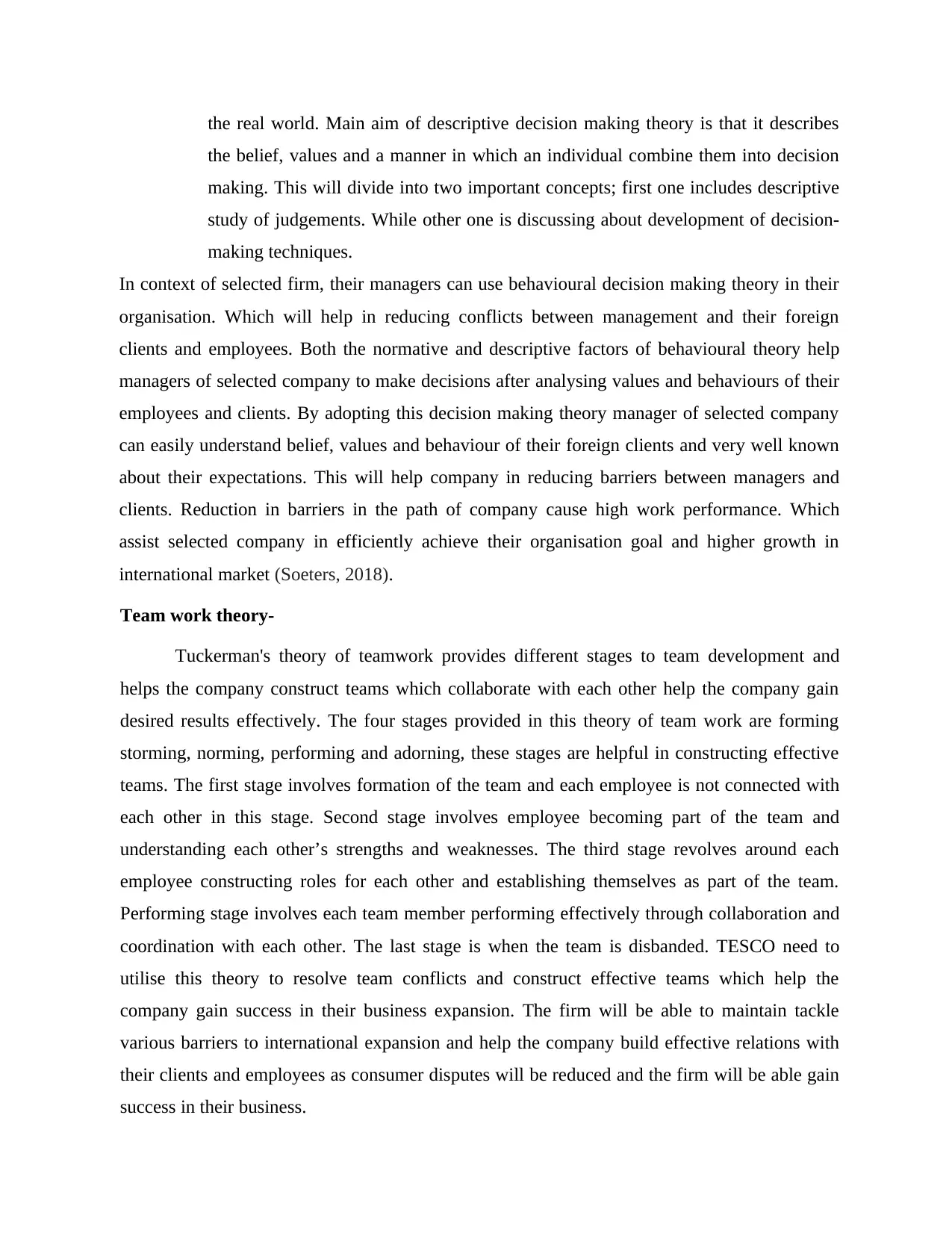
the real world. Main aim of descriptive decision making theory is that it describes
the belief, values and a manner in which an individual combine them into decision
making. This will divide into two important concepts; first one includes descriptive
study of judgements. While other one is discussing about development of decision-
making techniques.
In context of selected firm, their managers can use behavioural decision making theory in their
organisation. Which will help in reducing conflicts between management and their foreign
clients and employees. Both the normative and descriptive factors of behavioural theory help
managers of selected company to make decisions after analysing values and behaviours of their
employees and clients. By adopting this decision making theory manager of selected company
can easily understand belief, values and behaviour of their foreign clients and very well known
about their expectations. This will help company in reducing barriers between managers and
clients. Reduction in barriers in the path of company cause high work performance. Which
assist selected company in efficiently achieve their organisation goal and higher growth in
international market (Soeters, 2018).
Team work theory-
Tuckerman's theory of teamwork provides different stages to team development and
helps the company construct teams which collaborate with each other help the company gain
desired results effectively. The four stages provided in this theory of team work are forming
storming, norming, performing and adorning, these stages are helpful in constructing effective
teams. The first stage involves formation of the team and each employee is not connected with
each other in this stage. Second stage involves employee becoming part of the team and
understanding each other’s strengths and weaknesses. The third stage revolves around each
employee constructing roles for each other and establishing themselves as part of the team.
Performing stage involves each team member performing effectively through collaboration and
coordination with each other. The last stage is when the team is disbanded. TESCO need to
utilise this theory to resolve team conflicts and construct effective teams which help the
company gain success in their business expansion. The firm will be able to maintain tackle
various barriers to international expansion and help the company build effective relations with
their clients and employees as consumer disputes will be reduced and the firm will be able gain
success in their business.
the belief, values and a manner in which an individual combine them into decision
making. This will divide into two important concepts; first one includes descriptive
study of judgements. While other one is discussing about development of decision-
making techniques.
In context of selected firm, their managers can use behavioural decision making theory in their
organisation. Which will help in reducing conflicts between management and their foreign
clients and employees. Both the normative and descriptive factors of behavioural theory help
managers of selected company to make decisions after analysing values and behaviours of their
employees and clients. By adopting this decision making theory manager of selected company
can easily understand belief, values and behaviour of their foreign clients and very well known
about their expectations. This will help company in reducing barriers between managers and
clients. Reduction in barriers in the path of company cause high work performance. Which
assist selected company in efficiently achieve their organisation goal and higher growth in
international market (Soeters, 2018).
Team work theory-
Tuckerman's theory of teamwork provides different stages to team development and
helps the company construct teams which collaborate with each other help the company gain
desired results effectively. The four stages provided in this theory of team work are forming
storming, norming, performing and adorning, these stages are helpful in constructing effective
teams. The first stage involves formation of the team and each employee is not connected with
each other in this stage. Second stage involves employee becoming part of the team and
understanding each other’s strengths and weaknesses. The third stage revolves around each
employee constructing roles for each other and establishing themselves as part of the team.
Performing stage involves each team member performing effectively through collaboration and
coordination with each other. The last stage is when the team is disbanded. TESCO need to
utilise this theory to resolve team conflicts and construct effective teams which help the
company gain success in their business expansion. The firm will be able to maintain tackle
various barriers to international expansion and help the company build effective relations with
their clients and employees as consumer disputes will be reduced and the firm will be able gain
success in their business.
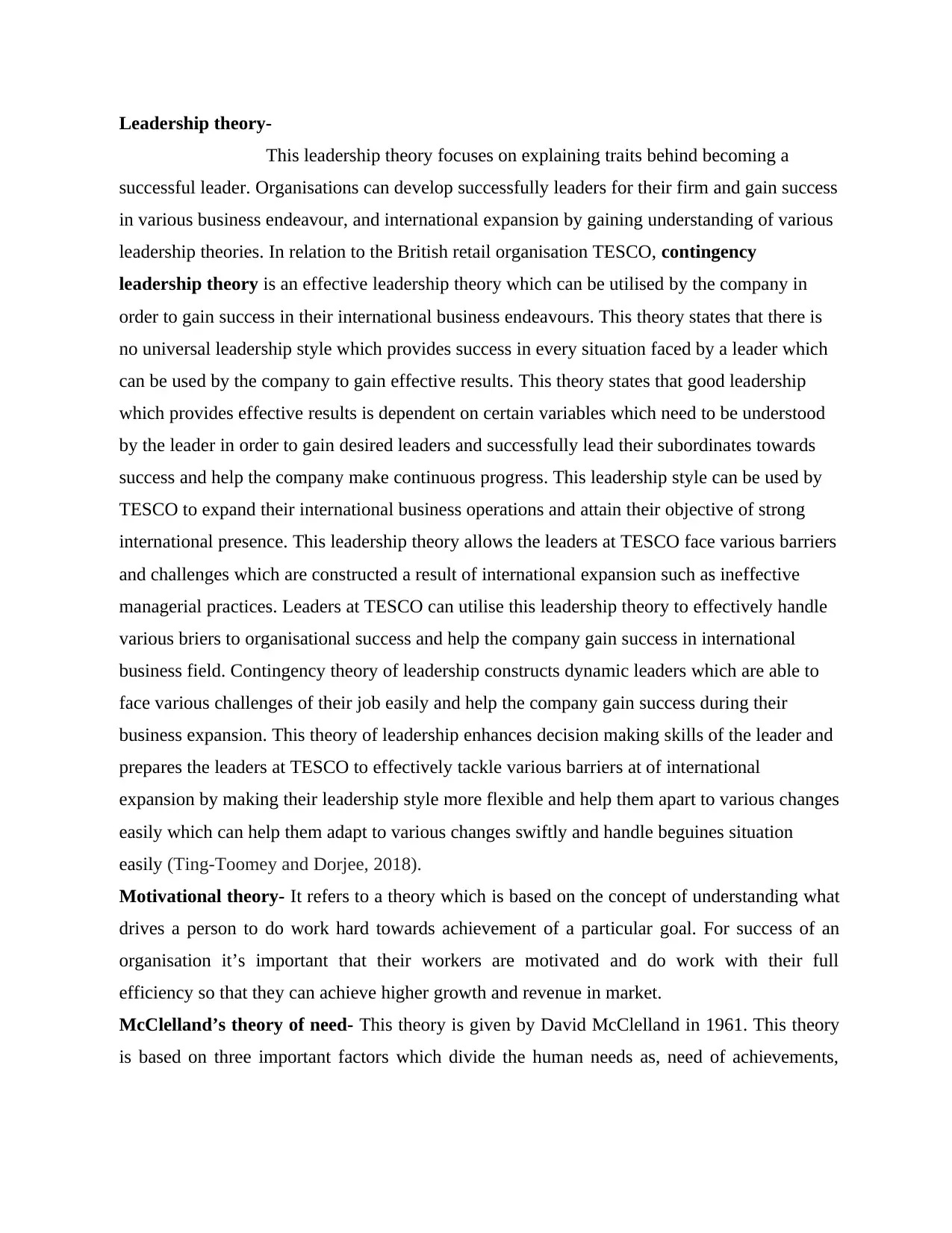
Leadership theory-
This leadership theory focuses on explaining traits behind becoming a
successful leader. Organisations can develop successfully leaders for their firm and gain success
in various business endeavour, and international expansion by gaining understanding of various
leadership theories. In relation to the British retail organisation TESCO, contingency
leadership theory is an effective leadership theory which can be utilised by the company in
order to gain success in their international business endeavours. This theory states that there is
no universal leadership style which provides success in every situation faced by a leader which
can be used by the company to gain effective results. This theory states that good leadership
which provides effective results is dependent on certain variables which need to be understood
by the leader in order to gain desired leaders and successfully lead their subordinates towards
success and help the company make continuous progress. This leadership style can be used by
TESCO to expand their international business operations and attain their objective of strong
international presence. This leadership theory allows the leaders at TESCO face various barriers
and challenges which are constructed a result of international expansion such as ineffective
managerial practices. Leaders at TESCO can utilise this leadership theory to effectively handle
various briers to organisational success and help the company gain success in international
business field. Contingency theory of leadership constructs dynamic leaders which are able to
face various challenges of their job easily and help the company gain success during their
business expansion. This theory of leadership enhances decision making skills of the leader and
prepares the leaders at TESCO to effectively tackle various barriers at of international
expansion by making their leadership style more flexible and help them apart to various changes
easily which can help them adapt to various changes swiftly and handle beguines situation
easily (Ting-Toomey and Dorjee, 2018).
Motivational theory- It refers to a theory which is based on the concept of understanding what
drives a person to do work hard towards achievement of a particular goal. For success of an
organisation it’s important that their workers are motivated and do work with their full
efficiency so that they can achieve higher growth and revenue in market.
McClelland’s theory of need- This theory is given by David McClelland in 1961. This theory
is based on three important factors which divide the human needs as, need of achievements,
This leadership theory focuses on explaining traits behind becoming a
successful leader. Organisations can develop successfully leaders for their firm and gain success
in various business endeavour, and international expansion by gaining understanding of various
leadership theories. In relation to the British retail organisation TESCO, contingency
leadership theory is an effective leadership theory which can be utilised by the company in
order to gain success in their international business endeavours. This theory states that there is
no universal leadership style which provides success in every situation faced by a leader which
can be used by the company to gain effective results. This theory states that good leadership
which provides effective results is dependent on certain variables which need to be understood
by the leader in order to gain desired leaders and successfully lead their subordinates towards
success and help the company make continuous progress. This leadership style can be used by
TESCO to expand their international business operations and attain their objective of strong
international presence. This leadership theory allows the leaders at TESCO face various barriers
and challenges which are constructed a result of international expansion such as ineffective
managerial practices. Leaders at TESCO can utilise this leadership theory to effectively handle
various briers to organisational success and help the company gain success in international
business field. Contingency theory of leadership constructs dynamic leaders which are able to
face various challenges of their job easily and help the company gain success during their
business expansion. This theory of leadership enhances decision making skills of the leader and
prepares the leaders at TESCO to effectively tackle various barriers at of international
expansion by making their leadership style more flexible and help them apart to various changes
easily which can help them adapt to various changes swiftly and handle beguines situation
easily (Ting-Toomey and Dorjee, 2018).
Motivational theory- It refers to a theory which is based on the concept of understanding what
drives a person to do work hard towards achievement of a particular goal. For success of an
organisation it’s important that their workers are motivated and do work with their full
efficiency so that they can achieve higher growth and revenue in market.
McClelland’s theory of need- This theory is given by David McClelland in 1961. This theory
is based on three important factors which divide the human needs as, need of achievements,
⊘ This is a preview!⊘
Do you want full access?
Subscribe today to unlock all pages.

Trusted by 1+ million students worldwide
1 out of 15
Related Documents
Your All-in-One AI-Powered Toolkit for Academic Success.
+13062052269
info@desklib.com
Available 24*7 on WhatsApp / Email
![[object Object]](/_next/static/media/star-bottom.7253800d.svg)
Unlock your academic potential
Copyright © 2020–2026 A2Z Services. All Rights Reserved. Developed and managed by ZUCOL.





